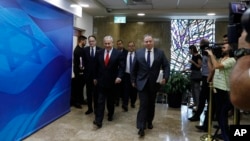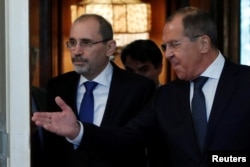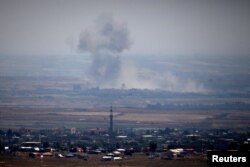Israel launched its newest air defense system on Monday on the Syrian frontier, where Damascus's Russian-backed forces have been routing rebels, as Moscow sent envoys for what it called "urgent" talks with Israeli Prime Minister Benjamin Netanyahu.
Netanyahu planned to meet Russia's foreign minister, Sergei Lavrov, and its armed forces chief, General Valery Gerasimov, later in the day, a visit the Israeli leader said was arranged last week at the request of Russian President Vladimir Putin.
Israel has been on high alert as Syrian President Bashar al-Assad regains ground from southern rebels, bringing his forces close to the Israeli-occupied Golan Heights.
In a sign of high tensions, Israel launched two David's Sling interceptor missiles at rockets which the Israeli military later said fell inside Syrian territory and were part of the internal fighting there.
It was Israel's first published operational use of the mid-range missiles, which are jointly manufactured by U.S. firm Raytheon Co. The incident triggered sirens in northern Israel and on the Golan.
The military did not immediately elaborate on whether the targets were shot down by David's Sling. Israel deployed the system last year to complement its short-range Iron Dome and long-range Arrow interceptors.
Netanyahu held talks with Putin in Moscow on July 11 amid Israeli concern that Assad, an old foe, may defy a 1974 demilitarisation deal on the Golan or allow his Iranian and Lebanese Hezbollah allies to deploy there.
Russia, whose foreign ministry confirmed Lavrov's visit, has said it wants to see the separation of forces on the frontier preserved. Lavrov's deputy, Grigory Karasin, told Russian media the foreign minister's trip was "urgent and important."
Netanyahu, in broadcast remarks, said he would tell the envoys that "Israel insists on the separation of forces agreement between us and Syria being honored, as they were honored for decades until the civil war in Syria broke out."
He also reaffirmed "Israel will continue to act against any attempt by Iran and its proxies to entrench militarily in Syria."
Syrian state television said on Sunday an Israeli air strike hit a military post in the city of Misyaf in Syria's Hama province but caused only material damage. An Israeli military spokeswoman said it does not comment on foreign reports.
Also on Sunday, hundreds of Syrian "White Helmet" rescue workers and their families fled advancing government forces and slipped over the border into Jordan with the help of Israeli soldiers and Western powers.







